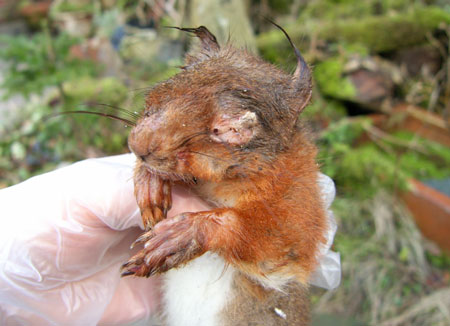Red squirrels are now an endangered species but at one time they could be found all over the UK. It is estimated that without action red squirrels will become extinct in England within a decade.
Grey Squirrels
The invasive, non-native grey squirrel was first introduced to England from America in the late 1870s, and has spread across the UK, causing the devastation of the UK red squirrel population. Interaction with the grey squirrel represents the most serious and urgent threat to our red squirrel population.
Grey squirrels:
- Carry disease in the form of the squirrel pox virus (SQPV), which as far as we are aware is always fatal when passed to red squirrels. Squirrel pox virus was first recorded in Cumbria in Spring 1998.
- Compete for food and habitat with red squirrels, eventually displacing them. Grey squirrels eat seven times more than red squirrels. They are more opportunistic feeders and will strip an area of natural foods before red squirrels have a chance to eat

Effects of Squirrel Pox Virus
Habitat Loss
Habitat loss is also of increasing concern now that we are losing trees to disease, rather than to planned forestry operations. Here in south Cumbria, Larch plantations have provided both habitat and food for red squirrels, but now these trees are being felled in great numbers because Larch disease (Phytophthora ramorum) has been detected. Even if these areas are replanted with red-squirrel-friendly alternative species of trees, it is going to take many years before they can provide the equivalent in food and shelter to the Larch they have replaced.
In addition, Storm Arwen, in November 2021, caused significant damage to plantations in south Cumbria, again causing sudden habitat loss for our local red squirrels.
Contrary to popular belief, red squirrels do not need vast conifer plantations in order to survive, although they may retreat into such areas when greys are present. If threats from grey squirrels can be removed, red squirrels should continue to thrive alongside the traditional farming, forestry and leisure activities that typify our area, as long as thought is given to the needs of red squirrels when decisions about planting, tree species, conservation and land management are being made.
We are more than happy to discuss red squirrel habitat and conservation with local landowners. Please contact us>>




